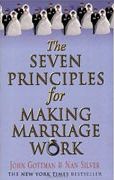 John Gottman, one of the authors of the book Seven Principles for Making Marriage Work is an expert in relationships. I first came across him in the book Blink : The Power of Thinking Without Thinking, written by Malcolm Gladwell. Gladwell went to vist Gottman at his Seattle “love lab” and discussed how Gottman had learnt to predict with a 91% accuracy whether a couple would stay together or divorce by watching them for a mere 5 minutes! in the Seven Principles of Making Marriage Work he and Silver outline clear ways to stay together with your partner.
John Gottman, one of the authors of the book Seven Principles for Making Marriage Work is an expert in relationships. I first came across him in the book Blink : The Power of Thinking Without Thinking, written by Malcolm Gladwell. Gladwell went to vist Gottman at his Seattle “love lab” and discussed how Gottman had learnt to predict with a 91% accuracy whether a couple would stay together or divorce by watching them for a mere 5 minutes! in the Seven Principles of Making Marriage Work he and Silver outline clear ways to stay together with your partner.
I have blogged about Gottman’s stuff before both in the post Relationship Break Up Signs – The Four Horsemen of Divorce and Four ways to improve your relationship – Antidotes to the Four Horsemen. I like Gottman’s work and much of it agrees with Harville Hendrix’s ideas on what keeps a couple together. As you will probably know from reading other blog posts of mine, I am training in Imago Relationship therapy and I use that when marriage counselling in Manchester. I mention that here because whilst reviewing any book on relationships it is easy for me to go off on one and start talking about how Gottman’s ideas, or Bader’s or whoever, fit in with Imago. I do solemnly swear that I will not do that in this review until the end, where I get to say what I think about the ideas contained within this book.
So, here’s what John Gottman and Nan Silver have to say about making marriage work.
Making Marriage Work
In Seven Principles for Making Marriage Work Gottman opens with an introduction about how his love lab is set up and how he predicts divorce. He looks for the following signs:
- Harsh startup. Where each spouse launches into an attack on the other with criticism or sarcasm. These start ups usually involve grandiosity too. Look out for “always” and “never” statements as they are difficult for the accused to come back from and invite defensiveness.
- The four horsemen of divorce . These are set ways of interacting with your partner that are likely to result in relationship breakdown. The horsemen are criticism, contempt, defensiveness and stonewalling. I have blogged about the horsemen in detail (click here to read) and how to avoid them (you can find that post here).
- Flooding. Flooding describes the process by which you become so worn out by the constant attacks by your partner and you find it so emotionally draining that you protect yourself from the attacks by emotionally disengaging. One partner, or even both, shut down emotionally and find it difficult to connect to each other’s pain.
- Body Language. When a husband and wife argue and things start to get heated then biologically both partners become triggered into protecting themselves. This flight or fight response can completely remove the ability of both partners to communicate effectively with each other and makes it difficult for a good outcome to result. From a biological point of view this makes sense. The lizard brain is fully in control and the logical, thinking brain is lacking in any kind of blood flow. In the book, Gottman and Silver explain that men are much worse at dealing with the stress caused by an argument and are more likely to think about how they can get even or allow the argument reinforces that they are not cared about. Experiencing regular arguments and constant flooding tends to lead to emotional disconnection and stonewalling (which is nearly always carried out by the man as they are less able to deal with the stress of an argument).
- Failed repair attempts. Gottman and Silver explain that couples that stay together are able to accept each others repair attempts during an argument. When the olive branch is offered, long lasting couples tend to accept it and couples in danger of splitting continue to argue as if it has never been offered in the first place.
- Bad Memories. When questioned, couples in danger of splitting up tend to see the entire relationship as having been bad. This rewriting of history colours all events. In the book there is an example of a couple discussing their wedding and being very critical about every part of it. Couples that stay together tend to see the relationship as positive whilst acknowledging that there has been some trying times which they have got through together.
These are the pointers that Gottman uses to identify a relationship that is in danger of failing. Next, Gottman and Silver go on to describe the principles that need to be in place to make sure the marriage works.
Gottman’s seven principles to Making Marriage Work
Gottman differs from several other theories of marriage counselling by suggesting that it is not how you manage the disagreements during your relationship that count, it’s how you manage the rest of your time. The principles he lays out in Seven Principles for Making Marriage Work are all geared to the peaceful times in the marriage rather than suggesting how to deal with the conflict.
Here’s a quick run down of each principle. In the book each principle forms a chapter and has a detailed explanation and exercises you can do as a couple or sometimes individually to improve in the area or assess the parts of the principle that you need to develop.
Principle 1 – Enhance your love maps.
One of the keys to making marriage work is to get to know your partner intimately. Intimacy is a much misunderstood concept and is rarely about sex. What Gottman and Silver are suggesting here is that couples that stay together tend to know a huge amount about each other. They know what’s going on in each others lives, which of their partner’s friends is annoying their partner at the moment, how work is going and why there may be tension there etc etc. Gottman and Silver name these “love maps” because they are a map to each partner’s emotional world. Once these maps are in place then its easier for the couple to understand what is going on for their partner when things are tough. They are more likely to be able to predict what their partner is thinking and feeling and respond accordingly.
Principle 2 – Nurture your fondness and admiration.
The next principle in Seven Principles for Making Marriage Work is to stay positive about your partner. This involves thinking positive thoughts and, get this, liking your partner. Yep, to have a happy marriage you have to like your partner. I say this not to mock Gottman and Silver but to point out a very important step in staying together in your relationship. It is so easy to see your partner as the enemy and I regularly work with couples who are close to detesting each other! The fondness and admiration also extends to the relationship history and involves appreciating the good times you have had together. This works as and antidote to number 6, above and means that you have warm feelings about your partner rather than angry ones.
I’ve seen the impact this has on real couples in every day life and I’m convinced it’s one of the reasons why my Mum and Dad have such a good relationship and have been married forever! I only started to notice after becoming a couples therapist, but my Mum is unrelentingly positive about my Dad. Even when he is not there she will list all of the great things he has done recently and talk with pride about him cooking great meals or working hard in the garden. After over 40 years of marriage this is very impressive and makes a huge difference to the dynamics between them (it’s also very sweet to watch!).
Principle 3 – Turn toward each other instead of away.
This next tip on making marriage work is about bids for intimacy. Gottman talks about bids for connection in other books that he has written (read The Relationship Cure: A 5 Step Guide to Strengthening Your Marriage, Family, and Friendships if you want to find out more about this idea). The general theory states that when someone bids for connection with you, for example, by initiating conversation or smiling at you, you have three choices of what to do. You can turn towards (say “hi” back), turn away (ignore the other) or turn against (say “why are you bothering me?”).
Making marriage work involves turning towards your partner as much as possible. If your spouse initiated conversation you stop what you are doing and you engage. Couples that turn towards each other stay together and have long lasting loving relationships.
Principle 4 – Let your partner influence you.
Making marriage work involves listening to your other half and taking into consideration. This is especially for the men out there! Evidence suggests that husbands who let their wives influence them have longer lasting more fulfilling relationships. This is not to say that if you are a man you have to go along with everything your wife says, it’s more that you will listen to her opinion and allow it to have a significant impact on the decisions that you make.
It’s like the old joke about the key words a husband needs to say to have a happy marriage – “yes dear”. So why put the focus on men in this principle. Research shows that women will naturally take on board what their husband is saying. It’s men that resist as if it’s an affront to their masculinity that they could listen and be influenced by their wife. More emotionally intelligent men realise that this is all part of the deal and that allowing themselves to be influenced by their wife sends a strong message that they trust, love and value their spouses opinion, making marriage work very smoothly.
Principle 5 – Solve your solvable problems.
In making marriage work, Gottman and Silver state that approximately 31% of all problems within a marriage are solvable. Now, it won’t take long for you to deduce that this leaves 69% of problems to be irresolvable and according to Gottman et al you would be right. This may seem a little depressing but don’t reach for the phone to call your divorce lawyer just yet.
Gottman and Silver suggest that you do not have to solve all of your problems, just be willing to discuss them in an open and honest way and be able to see movement as the relationship grows and matures. For the ones that are solvable, like who should do the washing up or take out the rubbish, Gottman et al suggest some useful techniques for keeping the discussion safe, they include:
- Discuss with soft start up “I know you work very hard and need to be home late sometimes and I miss you so wondered how we could see more of each other” as opposed to “you’re bloody late again, your dinner’s in the dog!”
- Make and receive repair attempts. For example, the the late coming home thing, “I can see that you feel angry about this and that is understandable because me coming home late must be very annoying for you, especially when I don’t ring”.
- Sooth yourself and each other by keeping calm and calming your partner.
- Compromise and be tolerant of each others faults.
In this section of Making Marriage Work there is also a list of common problems that many couples have and how to solve them amicably.
Principle 6 – Overcome gridlock.
A key part of Making Marriage Work is understanding that many of your problems and issues with each other will not necessarily be resolvable. You want to move to Australia, your partner doesn’t, you want to move to a bigger house, your wife wants to downsize, how do you solve these problems? As we have discussed above, 69% of all contentious issues are not resolvable. The key here is not to give up. Couples that stay together have regular dialogue about these issues and there are little movements over the years that make the other partner feel that they are being listened to and that it is worth putting up with these issues because there is always a forum for discussion about them.
In Seven Principles for Making Marriage Work there is a clear step by step guide for discussing theses issues and keeping it fair and safe. I’m not going to go into detail here but it will come as no surprise to find out that the method is similar to Imago dialogue (damn, I said I wasn’t going to mention Imago!)
Principle 7 – create shared meaning
Making Marriage work concludes with a section on creating shared meaning. The essence of this is joining with your spouse in values, family rituals, agreed roles in life, shared symbols etc. By incorporating all of these things into your life you are more likely to feel a deep connection to your partner and find it easier to forgive the little things and be willing to talk about the big things. Once more this makes sense and I’m sure that we all have examples of our own where we have “in” jokes with our partner and places that are important for the family to go together. Making Marriage Work encourages the development of these bonds and provides a questionnaire that you can use with your spouse to identify what the areas of shared meaning may be in your relationship.
My opinion of Making Marriage Work
I like Making Marriage Work, and I like it a lot! It is clearly written, has many exercises and questionnaires that you can sit down and have a go at with your other half and it has an easily followable format giving real, sensible advice that you can follow. Gottman and Silver are clearly experts in this field and I have no doubt that if you are mature enough emotionally to follow the advice within the book then you would be a long way down the road to making marriage work. There are many links with Imago Relationship Therapy, especially with focusing on the positive within your relationship, looking at each other with “loving eyes”, talking about difficult issues in a calm, safe way and being conscious in your relationship with your spouse.
Books like Making Marriage Work give great, practical advice, our job is to learn to follow it!
Thanks for reading this extremely long post! If you read Seven Principles for Making Marriage Work please comment on the book in the space below, I would love to hear what you think. I would also really appreciate it if you could click on the social media buttons at the top and bottom of this article so more people can find out about it and discover the secret of Making Marriage Work!


